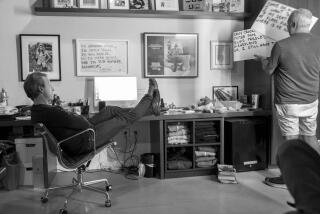Then and ‘Now’: PBS Chief’s Vision Got a Reality Check
- Share via
NEW YORK — When Pat Mitchell took the reins of PBS in March 2000, she made a new weekly public affairs series a centerpiece of her plans to reinvigorate the Public Broadcasting Service. That show, “Now With Bill Moyers,” finally got on the air Jan. 18, but its arrival has seemingly exposed inherent roadblocks PBS encounters when it attempts to move quickly as a loose confederation of autonomous local TV stations.
Not only is the Friday-night “Now” far less ambitious than Mitchell first envisioned but the chaotic process by which it got on the air has alienated some public affairs producers and public TV stations--including Washington’s WETA, New York’s WNET and Boston’s WGBH--whose leaders believe their ideas were shoved aside.
The esoteric Moyers, who has tackled everything from the Bible to chemical industry pollution in his long PBS career, is well respected and a proven audience draw, but he is not the new talent PBS said it wanted to develop. Even Moyers said he is doing the show partly because it was the only compromise the fractious PBS system could agree upon.
“Pat said, ‘You are the Switzerland of the system,’” he said, referring to that nation’s neutrality. Comparing the public television system with a Balkan war, he added, “I didn’t want [Mitchell] to become a casualty.”
Mitchell, said that although she’s heard the complaints, she is encouraged the show is even on the air, proving that public broadcasting is capable of reacting “in a way we haven’t been able to before. We actually can respond, change a schedule, put a new program in. It may not be perfect,” she said, but “Now” will “grow and get stronger.”
The proposed series began with “Public Square,” a sweeping multimedia project that Mitchell unveiled in January 2001, recalling the days of PBS’ “Omnibus” program. The new two-hour weekly programs would cover everything from the arts, books and popular culture to politics, religion, economics and history, with online and local community components. Grandly dubbed an “interactive national conversation,” it was to have interviews, documentaries, investigative reports, performance art, even a cabaret singer.
Michael Sullivan, executive producer of PBS’ investigative series “Frontline,” was put in charge of the project and came up with a plan that was ambitious and innovative by several accounts. But it had an annual budget of about $20 million--an enormous sum in the bare-bones public broadcasting climate. It also had the bad luck to be looking for corporate and foundation underwriting at a time when even established shows such as “The NewsHour With Jim Lehrer” were losing sponsors because of the difficult economy.
As late as August, PBS was still saying “Public Square” would launch in 2002, but no money was forthcoming. Then came Sept. 11, and PBS quickly tapped its regular public affairs contributors--including “NewsHour,” “Washington Week in Review” host Gwen Ifill and talk-show host Charlie Rose--for a number of well-received special reports. Moyers’ conversations with religious, academic and arts leaders particularly resonated with viewers.
Sullivan quietly returned to “Frontline” to oversee fast-turnaround terrorism documentaries.
At that point, Mitchell and her programming team saw an opportunity to get a public affairs show on the air. “We wanted to come up with a plan for us to stay on the story for the long haul,” said John Wilson, senior vice president and co-chief program executive at PBS.
However, it wouldn’t be “Public Square.” “It didn’t seem like the right environment to be raising money for that particular take,” Mitchell said.
Coincidentally, PBS had another new program about to launch, “Life 360,” which used a mix of documentary, humor and performance art to explore themes such as “Food” and “A Place in Time,” about fate.
Mitchell--who sources say pushed for an extensive last-minute reworking of “Life 360” even before Sept. 11--asked the co-producers, ABC News’ “Nightline” and Oregon Public Broadcasting, to essentially turn the program into an instant network-style newsmagazine addressing issues such as the war on terrorism. After much discussion, and amid what some sources said was ill will over the changes already requested, the producers said no.
“Nightline” executive producer Tom Bettag said the show declined because “we were so overextended” putting on the nightly ABC show. “We were just not in a position to throw out everything ‘Life 360’ was and start from scratch,” he said.
Wilson said that it soon “became very clear we were asking ‘Life 360’ to do something they were not created to do,” and possibly “dooming [it] to miss the mark.” As it turned out, the program struggled to find an audience anyway and has been pulled until summer, replaced by the Moyers show.
PBS then put out an informal call for proposals from its regular public affairs contributors. Because Moyers was simultaneously trying to launch his own weekly show, Wilson said, PBS made a Moyers interview segment a “must-have” for any proposal, along with input from National Public Radio correspondents, a collaboration NPR and PBS had long been seeking.
Many producers responded enthusiastically, including WETA in partnership with “NewsHour” and WGBH, which put together a plan with New York Times Television. Sources say WGBH and the New York Times even felt at one point that they had essentially been given a commitment for the show, only to have it abruptly disappear.
A WGBH spokeswoman said only that “we’re happy with the direction [‘Now’] has gone and it’s off to a good start.” Wilson said there was no commitment. “We seriously considered a lot of things.”
Moyers got the nod, Wilson said, because PBS knew it wanted him to be part of any show, and “increasingly, as we chased down ideas and avenues, it really became clear that if we wanted Moyers at the hub” the entire show should be based out of his production company, Public Affairs Television. As an added advantage, Moyers was able to bring corporate funding from Mutual of America Life Insurance Co., which helps underwrite most of his projects.
Moyers, Wilson said, “could negotiate the waters between and among all of the many major producing stations” and get input from them as well as others. “Frontline,” for one, is contributing to tonight’s show with a previously taped but not aired interview with former Enron Chairman Kenneth L. Lay about his meeting with Vice President Dick Cheney.
As for complaints about the process, Wilson said, “Sure, it was chaotic, but there wasn’t time to hold panel discussions and have everyone meet in a room in the Chicago Hilton to talk about it. We had to get it on the air and ... we had to move at a pace than what we otherwise might do.”
As for criticism that “Now” represents an established PBS voice as opposed to a new one, Mitchell said, “My answer is that Bill is the best, most recognized, most respected person we have in terms of public affairs, so why not start with our best foot forward and add the new to that?”
Moyers said when Mitchell approached him about taking over the entire production, he told her he couldn’t do it because his company was too busy. Feeling “badly about having let her down,” he changed his mind a week later. “I don’t have that much time left in the game, and I want to see her succeed,” he said.
John Siceloff was recruited from ABC News’ “Downtown” newsmagazine to produce the show, which Moyers calls a work in progress. Mitchell said that although initially she had more ambitious plans, there will be more opportunities to go further. “Now” may even get extended into the 10 p.m. hour with live interviews, she said.
“With Sept. 11, we had to reset our expectations and our needs,” Wilson added. “‘Public Square,’ like ‘Life 360,’ was conceived at a time of peace and prosperity.... This was a very different concept than we found ourselves needing on Sept. 12.”
*
“Now With Bill Moyers” airs tonight at 9 on KCET.
More to Read
The complete guide to home viewing
Get Screen Gab for everything about the TV shows and streaming movies everyone’s talking about.
You may occasionally receive promotional content from the Los Angeles Times.






